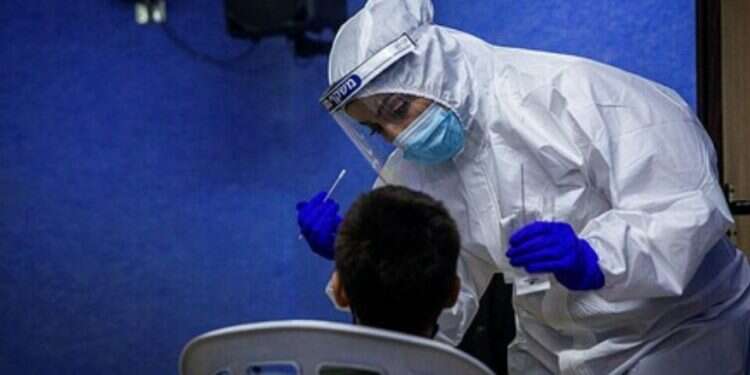The arrival of the Delta strain to Israel has led to a spike in daily coronavirus infections in the country. On Monday, the Military Intelligence Directorate reported 286 new coronavirus cases. There are currently 1,531 active cases in Israel, of which 497 got infected last week alone.
Follow Israel Hayom on Facebook and Twitter
Israel has recorded 841,319 coronavirus cases, including 6,429 deaths, since the global pandemic erupted in March 2020.
Of the 44,445 Israelis screened for the virus in the last 24 hours, 286 (0.64%) tested positive, setting the current infection rate at 1.91.
The Health Ministry designated several more cities as "red" due to the increase in morbidity, among them Kochav Yair, Binyamina-Giv'at Ada, Kfar Saba and Tzofim. There was an increase in morbidity in Tel Aviv as well, which is why it was designated "orange." Herzliya, Modi'in-Maccabim-Re'ut, Pardes Hanna-Karkur and Ramle were designated as "yellow."
Under the ministry's "stoplight" ranking, each designation carries different restrictions on public life, particularly public gatherings in closed spaces.
The military task force warned that unless the spread of infection is halted, it could lead to a significant increase in the morbidity rate and put the lives of the population, especially unvaccinated Israelis, at risk.
According to officials, the Delta strain seems to be twice as contagious and deadly as the British variant. Nevertheless, the vaccination campaign appears to be working in preventing hospitalizations because, in the past two weeks, there has been just one COVID death in Israel.
According to health officials, "It appears that the Pfizer vaccine is effective (96%) in preventing serious illness from this variant, but one must receive both doses of the vaccine for maximum protection, and for those who have only received one inoculation, its effectiveness is significantly lower."
They added that "it appears that even vaccinated people may get infected with this variant, and infect others, at an unknown rate, and therefore the World Health Organization recommends that all those inoculated continue to wear masks in public spaces, as is also instructed by the Health Ministry."
In an effort to encourage more Israeli teenagers to get vaccinated, Prime Minister Naftali Bennett and Health Minister Nitzan Horowitz visited a vaccination site in Holon in southern Israel to speak with the youngsters who came to get immunized.
Bennett also posted a video on Twitter in which he encouraged them and their parents to get inoculated. "The vaccine will both protect your health and will prevent you from missing all the fun of the summer vacation," he said.
Prime Minister Naftali Bennett issued a special appeal this morning to the Israeli youth, asking them to get vaccinated as soon as possible:
"Talk to your parents and go get vaccinated so we will have a wonderful summer without lockdowns or restrictions." pic.twitter.com/9WkJYrg2Ko— PM of Israel (@IsraeliPM) June 28, 2021
He warned of the danger of the Delta strain and said, "At the moment, there are enough vaccines for everyone. However, there is a catch: their validity is due to expire soon and then we will not have enough vaccines on hand for everybody."
Meanwhile, a new study from Oxford University found that mixing the AstraZeneca and Pfizer-BioNTech vaccines generates a strong immune response, which the study's lead author said could potentially offer more flexibility in administering the two-shot regimen.
The Com-COV trial compared mixed two-dose schedules of Pfizer and AstraZeneca vaccines, and found that in any combination, they produced high concentrations of antibodies against the coronavirus spike protein.
The data provides support for the decision of some European countries that have started offering alternatives to AstraZeneca as a second shot after the vaccine was linked to rare blood clots.
Subscribe to Israel Hayom's daily newsletter and never miss our top stories!
Spain and Germany are mixing Pfizer and Moderna jabs as a second dose for younger people who already received a first AstraZeneca shot due to the blood clot concerns.
Matthew Snape, the Oxford professor behind the trial, said that the findings could be used to give flexibility to vaccine rollouts, but was not large enough to recommend a broader shift away from clinically approved schedules on its own.
"It's certainly encouraging that these antibody and T-cell responses look good with the mixed schedules, but I think your default has to stay, unless there's a very good reason otherwise, to what is proven to work," Snape said.
The greatest immune response came from taking two doses of the Pfizer vaccine. However, the AstraZeneca-Pfizer and Pfizer-AstraZeneca combinations produced more antibodies than the two-dose schedule for just AstraZeneca.
i24NEWS contributed to this report.




